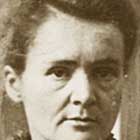"Life is not easy for any of us. But what of that? We must have perseverance and, above all, confidence in ourselves. We must believe that we are gifted for something, and that this thing, at whatever cost, must be attained." ~ Marie Curie
Gifted and dedicated physicist Marie Sklodowska Curie (1867-1934) was born on this day in Warsaw, Poland, in her own words "a prisoner in chains" in a country occupied for over a century by Austria, Prussia, and Russia.
She left home to study in Paris, where she met and married physics professor Pierre Curie.
"Each of us must work for our own improvement... share a general responsibility for all humanity," Madame Curie said. "Our particular duty being to aid those to whom we think we can be most useful."
Called "the twentieth century's most exceptional woman" by writer Paul Strathern, Curie changed the world with her discoveries...
She discovered that an atom can spontaneously break apart, releasing energy and isolated the radioactive elements polonium and radium. Coining the term radioactivity, she created the x-ray machine which was used to examine soldiers in World War I.
"I was taught that the way of progress is neither swift nor easy," said Curie who became the first woman to win a Nobel Prize and the first person to win two Nobel Prizes (1903, 1911).
"All my life through, the new sights of nature made me rejoice like a child," the great scientist once explained. The first female professor at the Sorbonne, she founded the world-famous Radium Institute in Paris.
"I never see what has been done; I only see what remains to be done," said the woman who drove bravely to the war front to operate and repair her x-ray machines.
"Nothing in life is to be feared. It is only to be understood," she believed. With years of painstaking work, Curie passionately influenced science innovations, creating new possibilities for medical research and treatment.
Upon her death, Albert Einstein said, "Marie Curie is, of all celebrated beings, the only one whom fame has not corrupted."
 Use your gifts with steadfast determination.
Use your gifts with steadfast determination.
